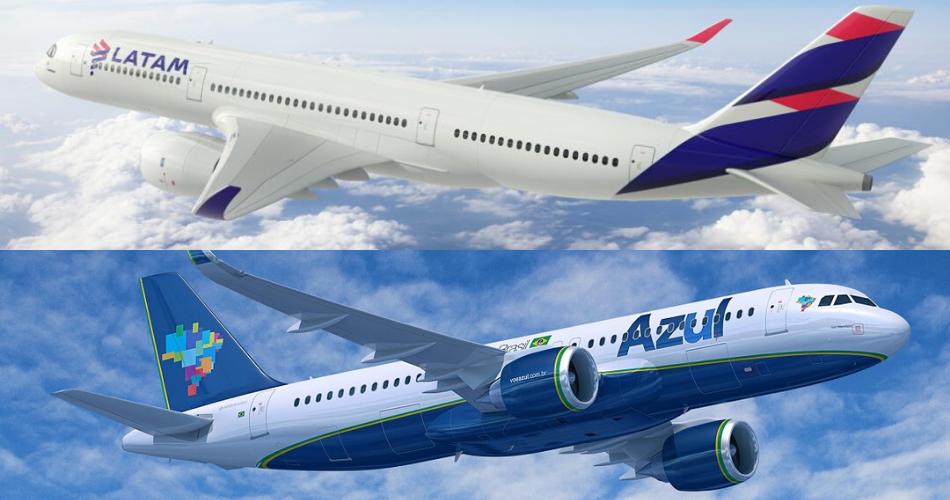RIO DE JANEIRO, BRAZIL – With the dramatic changes in habits following the novel coronavirus pandemic and the sharp economic downturn, the pace of recovery in the airline industry is unclear. On Tuesday, June 16th, Azul and Latam announced a codeshare (flight sharing) agreement and a joint fidelity program to tackle one of the worst crises the sector has ever faced in the world. Whether or not these measures will be enough for the companies to survive remains to be seen.

The codeshare agreement will initially include 50 domestic non-overlapping routes in addition to shared tickets for luggage check-in and forwarding. According to a statement from Azul, the tickets will be available for sale in the coming months.
The two companies have also signed an agreement for their frequent flyer programs, enabling 12 million TudoAzul members and 37 million Latam Pass members to collect points in the program of their choice.
“This partnership will endure for many years and will strengthen the domestic market,” said John Rodgerson, president of Azul, in a teleconference with journalists.
Asked about a potential future merger, the executive said only that the partnership “should grow” in the coming years.
Last month, Latam’s parent filed for bankruptcy in the United States. The group’s request includes its affiliates in Chile, Peru, Colombia, and Ecuador, but Brazil, Argentina, and Paraguay were not included.
Worldwide, some companies like British Flybe have now closed. Another British company, RyanAir, announced a 99.5 percent reduction in the number of flights during the strictest lockdown period. In the United States, the seven leading airlines have lost a large share of their market value.
The trend is a reflection of the sharp downturn in the airline market, with sales virtually wiped out at the peak of the pandemic. A slow rebound is now expected, with companies operating at around 20 percent capacity – and very high fixed costs to overcome.
For Guilherme Amaral, partner of ASBZ Attorneys and an expert in the field, the airline market is expected to be back in the second half of this year, albeit with no forecast as to the speed and magnitude of the rebound.
“We do not yet know the actual control of the pandemic, if there will be a second wave of contagion and if the changes in habits will be permanent. It is an equation that has no fixed numbers, only variables”.
The specialist does not rule out a new consolidation movement in the airline industry worldwide. As an example, he mentions the American market, where there are four large companies operating and countless small-scale ones.
“Competition authorities would prevent a concentration in other moments in history. With the pandemic, everything has changed, nobody knows what the market might be like from now on”.
Amaral sees the same scenario for Brazil. In December 2018, Avianca’s local operation filed for bankruptcy in the country and, in May this year, the holding company filed for reorganization in the Americas.
“Besides the difficulties that the airlines were already facing, there is a long period of uncertainty ahead. It may be that some of the local players are not healthy enough to survive,” Amaral says.
Slow steps
Last week, Azul announced its goal to increase the number of daily flights by the end of July, in another step to resume the company’s activities.
“We have great flexibility. Little by little we’re going to have a resumption. Nobody knows when demand will come back, but we are sure that it is safe to travel with us, and traveling again is necessary,” said the president of Azul.
While the resumption occurs in dribs and drabs, the Brazilian government is discussing a rescue package for airlines, which should be around R$4 billion. The president of Azul says that in the United States and Europe, the amount allocated for the survival of companies was “much higher” than in Brazil.
“Many people depend on Azul, passengers, employees, even EMBRAER depends on our company. A healthy Azul is good for everyone,” Rodgerson said.
Source: Exame

